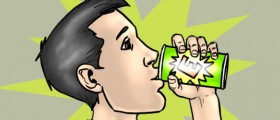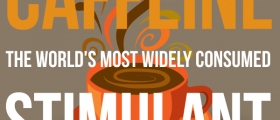
Caffeine Dependence
Caffeine is a chemical substance which stimulates the central nervous system, hearth, and muscles, and it is absorbed very quickly. Caffeine is the most popular drug in the world. The only commodity that has been traded more frequently is petroleum. In the US, the most often consumed beverages are soft drinks, and many contain smaller or larger dosages of caffeine. According to the data from certain trade groups, the consumption of soft drinks per capita in one year is estimated at 56 gallons. One of the reasons why caffeine has been appealing to so many individuals for so long is its psycho stimulant effect. Caffeine effect on an average person includes a boost of energy and cognitive stimulation.
On the other hand, there are also those persons who react adversely to the substance. For instance, if an individual with an underlying psychological problem, such as a mood disorder, and a predisposition for not tolerating caffeine consumed in large amounts introduces large doses of caffeine into his/her body, there is a possibility that symptomatic distress will arise. Among many drinks containing caffeine, coffee seems to be the most popular one. When it comes to the chemical properties of coffee, there are both positive and negative heath effects. For instance, some clinical trials have shown that coffee consumption can decrease the risk of certain cancers, Alzheimer’s disease, and diabetes. At the same time, it is also known to increase cholesterol levels. In addition, as many individuals are battling fatigue in today’s fast-paced culture, other than opting for potent illicit drugs, most people turn to energy drinks and coffee in order to stay alert. If taken in moderation, caffeine does the job without creating any psychological disturbances. However, if a person starts to drink large amounts of the beverage there is a possibility that sleep problems will arise, as well as irritability, nervousness, and mood fluctuations. Still, excess amount of coffee can produce the opposite effect of the one initially intended.
When it comes to caffeine dependence, an average American consumes 220 mg of caffeine on a daily basis. More than 75 percent of the daily caffeine intake comes from coffee. Even children consume caffeine through soft drinks, and caffeine containing foods. The worldwide consumption of caffeine is substantially lower and it is estimated at around 75 mg per day. Also, energy drinks have been gaining in popularity for the past couple of decades. Energy drinks are produced from a combination of herbal blends and caffeine in order to create an energy boost. Energy drinks can contain anywhere between 50 and 300 mg of caffeine. In the case of correlation of physical health and caffeine consumption, researchers believe moderate amounts of caffeine can reduce the risk of prostate cancer. Also, no link has been established between drinking caffeine containing beverages and breast cancer.
Mood Disorder Caused by Caffeine
There are various types of psychological effects precipitated by caffeine consumption. For instance, the effects of caffeine are related to the dose that is consumed. An average individual can drink up to 300 mg of caffeine per day without experiencing any behavioral problems. When it comes to sleep, around 200 mg on a daily basis is a sufficient amount to cause insomnia and sleep disturbance. Finally, 1 g per day of caffeine or more usually leads to poisoning and similar toxic effects in susceptible individuals. Caffeine intoxication is manifested through restlessness, fidgeting, sleep disturbance, frequent voiding of the bladder, muscle twitching, and so on. Some of the more serious overdoses are accompanied by depression, problems with orientation, psychosis, while in some extreme cases caffeine overdose can result in death. Caffeine withdrawal symptoms include headaches, problems with concentration, and abdominal pain. Withdrawal usually begins a day or two after the last intake of caffeine and can last from one to five days. As far as the prevalence of caffeine induced psychiatric disorders goes, it has been fairly difficult to estimate the rate. Mood disorders and substance abuse problems are known to be comorbid, i.e. present at the same time in the same individual. In addition, there are some clinical research studies that suggest there is a link between family history of alcohol abuse and difficulties abstaining from caffeine during pregnancy. Also, pregnant women with family history of alcoholism ignored their health care provider’s advice to stop drinking coffee while at the same time consuming more amounts of coffee than is considered safe. A certain number of women needed interventions from their primary health care providers in order to reduce the amount of caffeine intake. Some of the negative aspects of drinking caffeine containing beverages during pregnancy include miscarriages and reduced fetal development. In US, UK, and Canada, there are health warnings in place issued by government agencies advising pregnant women not to take more than 200 – 300 mg of caffeine per day.

















Your thoughts on this
Loading...